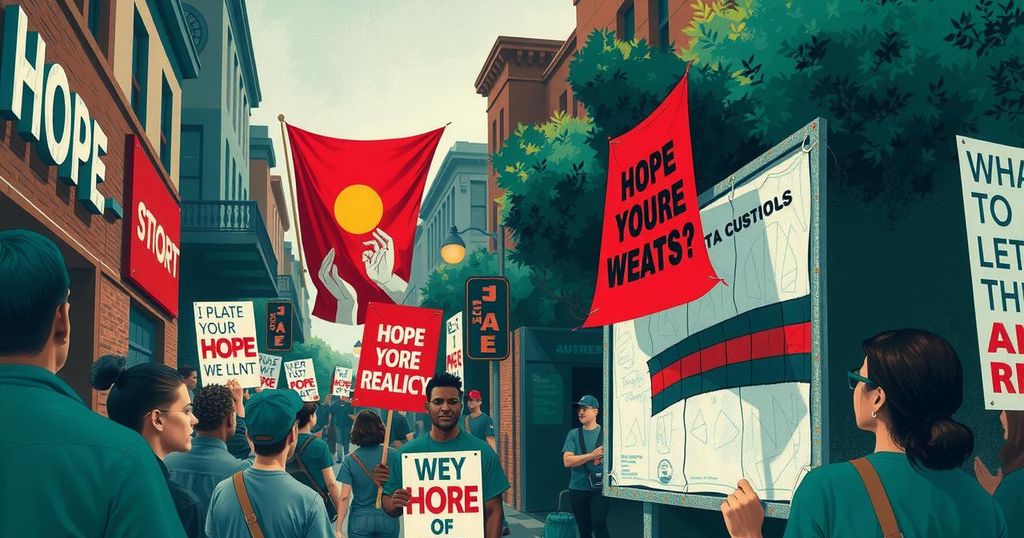Mahmoud Khalil, a Palestinian activist and Columbia University student, faces deportation under the Trump administration’s scrutiny of pro-Palestinian activism. His case raises significant concerns about free speech and the legality of deporting a U.S. permanent resident without criminal charges. Khalil’s involvement in campus protests and his professional background highlight complex dynamics surrounding activism and immigration policy.
Mahmoud Khalil, a notable figure in the Gaza war protests at Columbia University during the spring of 2024, has attracted international scrutiny following his detention by the Trump administration, which seeks to deport him. This case has spotlighted issues regarding free speech on college campuses and the mechanisms that could result in the deportation of a U.S. permanent resident.
Mr. Khalil, after a Wednesday court hearing, remains in detention in Louisiana while discussions continue regarding a possible transfer back to New York. His arrest is reportedly linked to President Trump’s crackdown on student demonstrators, whom he accuses of engaging in “un-American activity.” Notably, Trump has asserted that pro-Palestinian activists, including Khalil, show support for Hamas and suggested that their deportation would be part of broader actions to follow.
At 30 years of age, Khalil’s legal team emphasizes that his participation in demonstrations advocating for Palestinian rights represents the exercise of free speech. They claim that the government’s actions signify a troubling trend of repressing student activism and political discourse. Despite the immigration authorities’ attempts to revoke his green card, a federal judge has temporarily blocked his deportation, pending further legal proceedings.
Born in Syria to Palestinian refugees, Mr. Khalil graduated with a degree in computer science before engaging with the Syrian-American non-profit Jusoor and managing scholarship programs for the British Embassy in Beirut, according to his biography. He relocated to the United States in 2022 to pursue a master’s degree at Columbia University’s School of International and Public Affairs, where he became notable for his activism.
During the protests at Columbia, Mr. Khalil assumed a key role in mediating discussions between university officials and student demonstrators. Although accused by some of leading the Columbia University Apartheid Divest group, he has clarified that he only acted as a spokesperson, denying any leadership role in the organization.
In the wake of his arrest, federal authorities alleged that Mr. Khalil coordinated protests that disseminated pro-Hamas propaganda, but provided no concrete evidence to support these claims. His legal team contends there is no basis for suggesting his involvement with any terrorist organization, asserting the government’s actions are intended to intimidate others.
The protests at Columbia have faced criticism from some Jewish students alleging incitement of antisemitism. The Columbia Jewish Alumni Association condemned Mr. Khalil, asserting he misused the privileges afforded to him by the university and the country. The Trump administration has also utilized controversial measures against the university in response to complaints regarding student safety.
Legal experts highlight that while green card holders can be subjected to deportation on national security grounds, the specific targeting of individual protesters remains exceptional. Some scholars indicate that the current actions against Khalil signal a concerning precedent.
Previously, Mr. Khalil faced suspension from Columbia, which he argued was unwarranted and lacked due process. Despite this, he pledged to continue advocating for his causes. His wife has since shared that he had begun worrying about the repercussions of his activism, leading him to seek legal assistance shortly before his arrest.
His arrest has triggered protests in New York City, drawing significant participation from students and faculty alike. Civil rights advocates have condemned the potential deportation as an infringement on the First Amendment. Prominent figures like New York Attorney General Letitia James have expressed deep concern over the matter. The federal government has justified its actions by asserting a commitment to oppose any form of support for entities deemed terrorist organizations, arguing for national security interests.
Mahmoud Khalil’s case exemplifies the intersection of free speech and immigration enforcement within the United States. His arrest has raised significant legal and ethical questions regarding the targeting of individuals based on activism, particularly in regard to their rights as green card holders. The resulting uproar signifies a broader dialogue on the implications of such actions for student activism and the legal precedents they may establish. As this case evolves, it remains crucial to scrutinize the balance between national security and the principles of free speech that underpin democratic societies.
Original Source: www.bbc.com






